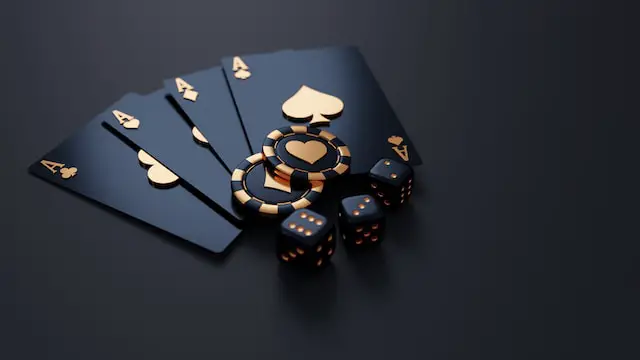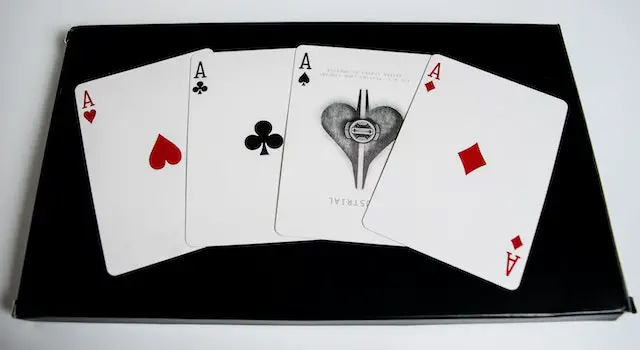How Much Is An Ace Worth In Blackjack?
Except for the King, Queen, and Jack, which count as 10, other cards are valued at their face value. Unless it would give a player or the dealer a score higher than 21, in which case it has a value of 1, an ace will always have a value of 11.
The Basics Of Blackjack
Blackjack is a favored game of cards that is played in casinos across the world. It is an act of strategy and skill played against dealers in a race to get a hand as close as possible to 21 without exceeding it.
The Objective Of The Game And Card Values
The main objective of blackjack is to beat the dealer’s hand without going over 21. Every player plays against the dealer on their own instead of against the other players. The dealer is the house, and if the total of a player’s hands exceeds 21, it is an automatic loss regardless of how the dealer’s hands are. If the dealer’s hand exceeds 21, players who haven’t already busted can win a prize.
Knowing the value assigned to each card is vital when playing blackjack. Usually, cards 2 to 10 are valued at their face value. The face cards (i.e., Jacks, Queens, and Kings) are worth 10. The ace is a unique card with one of the values, either one or eleven, based on the player’s preferences and the requirements of the hand. The flexibility of the ace is the reason blackjack has its distinctive and strategic gameplay.
Basic Strategies
Although blackjack is a chance-based game, applying basic strategies can greatly increase the chances of winning. Here are some basic strategies to take into consideration:
Learn the Basic Strategies: The basic strategy is an algorithmically calculated set of rules that guide players to the best option based on the value of their hands and the dealer’s upcard. It assists in optimizing decision-making and reduces the advantage of the house.
Know the basics of card counting: Card counting is a technique employed by professional players to keep an eye on the cards they have been dealt and to determine the probability of low or high cards that remain within the deck. While it isn’t prohibited, casinos do not endorse it, and those who use this method often quit.
Control Your Bankroll: It is vital to create and adhere to your budget. Decide how much you will spend and stay clear of losing money. Make sure you set limits for your bets to ensure you can keep playing for a long time.
Calculating The Value Of An Ace
The ace is a distinctive and versatile card with immense significance in the blackjack game. Like other cards in value, the value of the ace can differ between 1 and 11 based on the hand of the player as well as their strategic decisions. Knowing how to determine the worth of an ace is essential to making an informed decision during games.
The Value Of An Ace Is 11
If a player is presented with an ace or higher, they can value it at 11 to greatly enhance the value of their hand. For instance, if a player has an ace and a 7, valuing the ace at 11 will give them a hand value of 18. This can be beneficial when trying to build a hand that is close to 21 without putting yourself at risk of losing the pot.
If a player is dealt multiple aces, each could be valued at 11 if the hand’s total doesn’t exceed 21. For instance, if a player owns an ace and a second ace, then valuing both of them at 11 would result in an overall value of 22, which is greater than 21 and causes the player to be busted. One ace should be revalued to 1 in such situations to avoid busting.
The Value Of An Ace As 1
One of the most important advantages of blackjack is the capacity to alter the value of an ace from 11 to 1 if required. This allows players to adjust their hand totals to avoid exceeding 21. For instance, when the player has an average hand of 18 and has an ace, valuing it at 11 will result in a hand total of 29. This is a waste. In this case, the player will have to adjust the value of the ace to 1 to reduce the total of his hand to a manageable 19.
In addition to the player who has a hand-to-hand total of 17 or more and receives an, it will typically require valuing it as 1 to prevent it from busting. By using an ace value of 1, players can keep an acceptable hand total and also have an opportunity to win the game.
Ace Variations In Different Blackjack Games
While the basic rules of blackjack remain the same across various versions of the game, some rules may alter the value and effectiveness of the ace.
Payout Structures And Blackjack Variations
In some blackjack variations, the structure of payouts can influence the worth of an ace. For instance, in the standard blackjack game, when a blackjack (an ace and ten-value card) pays 3:2, the ace is of significant value. However, there are certain variations, such as “Blackjack Switch,” where natural Blackjack pays even money (1:1). The value of an ace is reduced.
In games with low blackjack payouts, players might be less likely to risk a gamble when they have an ace valued at 11. They might count the ace as one more often to avoid busting or remain more cautious.
Rule Variations And Ace Usage
Different blackjack rules can affect the value and use of the ace. One of the most common rules is to allow surrender. Players can surrender their hands in certain games and forfeit a portion of the bet. If surrendering is permitted, it can affect the player’s decision on the significance of an ace.
For instance, when the player has an overall hand value of 16 against the dealer’s 10, surrendering an option using the Ace as 11 could result in the hand total being 17. In this scenario, it is the best option to limit losses. If surrendering is not permitted, players may want to consider valuing the ace at 1 to lessen the risk of crashing.
Common Misconceptions And Myths
Like every popular game, blackjack has had many myths propagated over time. These misperceptions can cause poor decision-making and affect the overall experience.
Card Counting Guarantees Winnings
One of the most common myths about blackjack is that counting cards ensures consistent wins. It is a technique that involves keeping an eye on the cards played to gain an edge over the house. While it is an effective tool when used with skill, it doesn’t guarantee the same results over time.
Card counting gives players information on the deck’s makeup, allowing them to make more informed decisions when betting and playing. However, it doesn’t guarantee specific outcomes for each hand. The benefit of counting cards is comparatively small, and players must rely on luck and a proper strategy to make consistent wins over the long term.
The Deck Needs To Be Shuffled After A Winning Streak
Another common misconception is that the deck must be reshuffled by a dealer following the conclusion of a winning streak. Some believe casinos manipulate the outcome to end a winning streak and restore the house’s advantage. But this is an illusion.
In real life, the outcome of every blackjack game is decided by the random distribution of blackjack cards and the player’s choices. The dealer does not have influence over the cards’ arrangement or the game’s outcomes. The deck is usually moved following the casino’s set procedure or at a certain level in the shoe, regardless of whether the players are on a winning or losing streak.
FAQ’s
How much is an ace worth in blackjack?
In blackjack, an ace is worth either 1 point or 11 points, depending on which value benefits the player’s hand the most.
Can the value of an ace change during a blackjack game?
No, once the value of an ace is determined at the beginning of a hand, it remains fixed throughout the game.
How do I decide the value of an ace in my hand?
The value of an ace is determined by the player based on their hand’s total value. If counting the ace as 11 won’t cause a bust, it’s usually more advantageous.
Does the dealer have the same flexibility with the value of an ace?
Yes, just like players, the dealer can choose to count an ace as 1 or 11, depending on the dealer’s hand and the casino’s specific rules.
Can an ace be worth 1 and 11 at the same time?
No, in a single hand, an ace can only have one value. However, in different hands within the same game, the ace can switch its value between 1 and 11.
Is the value of an ace always the same in every variant of blackjack?
While the general rule is that an ace can be worth 1 or 11, the specific value of an ace can vary slightly between different blackjack variants or specific casino rules. It’s always best to check the rules of the game you’re playing to be sure.
















